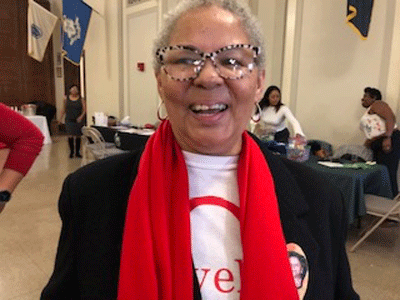This year, for the first time, more than half of people living with HIV in the U.S. will be older than 50.
In Baltimore, health officials said that number is likely even greater.
After listening to healthcare providers, advocates and aging individuals living with HIV, officials at Gilead Sciences, a California-based biotechnology company that focuses on antiviral drugs used in the treatment of HIV and other viruses, said they realized more resources were needed to address their needs.
The company announced the Gilead HIV Age Positively initiative, where officials handed out grants totaling $17.6 million to 30 different organizations in the country, including $700,000 for the Association of Nurses in AIDS Care (ANAC) where Baltimore’s Melanie Reese serves on the board of directors.
“HIV is no longer a death sentence and it hasn’t been for quite some time,” said Reese, who also serves as executive director of the Baltimore-based nonprofit, Older Women Embracing Life – or OWEL.
“Until fairly recently in the HIV epidemic, there’s been little awareness of the presence and impact of HIV/AIDS in the older population; this has been particularly true regarding women,” Reese said.
Health statistics have revealed the number of people living with HIV over the age of 50 is expected to grow beyond the current estimate of 50 percent to 70 percent by 2030.
Reese and officials at Gilead said people living with HIV are facing a new set of challenges as they age, as do the healthcare providers and the broader community of allies who support them.
“A lot of people didn’t know these statistics primarily because there isn’t a lot of talk about HIV,” Reese said.
“Just as the general population is aging, so are those living with HIV. In Baltimore, it’s actually over 50 percent but with medication that has improved over the span of time, people are living longer and it’s easier to take the medicine regiment,” she said.
As the nation observes Minority Health Month, the Centers for Disease Control and Prevention has reported disproportionately high rates of infection in the black and Latino communities.
Latinos are approximately 16 percent of America’s population, but represent 26 percent of new HIV diagnosis.
African Americans represent only 13 percent of the U.S. population, but account for 43 percent of all HIV diagnoses.
This has led to the challenge of aging with HIV disproportionately affecting these communities,” Reese said, noting that the grants – part of the “Age Positively” initiative – should help ensure organizations from healthcare clinics to advocacy groups are lifting up programs that help those aging with HIV.
Several of the organizations receiving “Age Positively” grants are both led by minorities and creating programs to support minorities aging with HIV, Gilead officials said.
Grantee organizations are working to improve care coordination, increase resources for a better well-being, expand education and inform policy, officials said, adding that those aging with HIV have unique needs that not all providers are equipped to meet.
The grantees work to make sure people aging with HIV receive care tailored to their needs through continuing education and training programs for doctors and nurses, co-location of medical services innovative models of care, and other strategies, according to a news release.
As a recipient of the grant, ANAC will continue to promote the health and welfare of people affected by HIV by creating an effective, engaged network of nurses in AIDS care and studying, researching and exchanging information, experiences and ideas leading to improved care and prevention, Reese said.
The organization also will provide leadership to the nursing community in matters related to HIV and AIDS infection and its co-morbidities while continuing to advocate for effective public policies and quality care and promoting social awareness concerning issues related to HIV and AIDS.
“What I’d like for everyone to do is to take the test because it’s not the end, it’s only the beginning and I’d like everyone to know that everybody has an HIV status either positive or negative,” Reese said.
“They should know that there’s a continuum of care in place to help those who are positive to become virally suppressed and healthy and there’s a continuum of care to keep individuals negative so they’ll never have to go through the trauma of being diagnosed with HIV,” she said.
